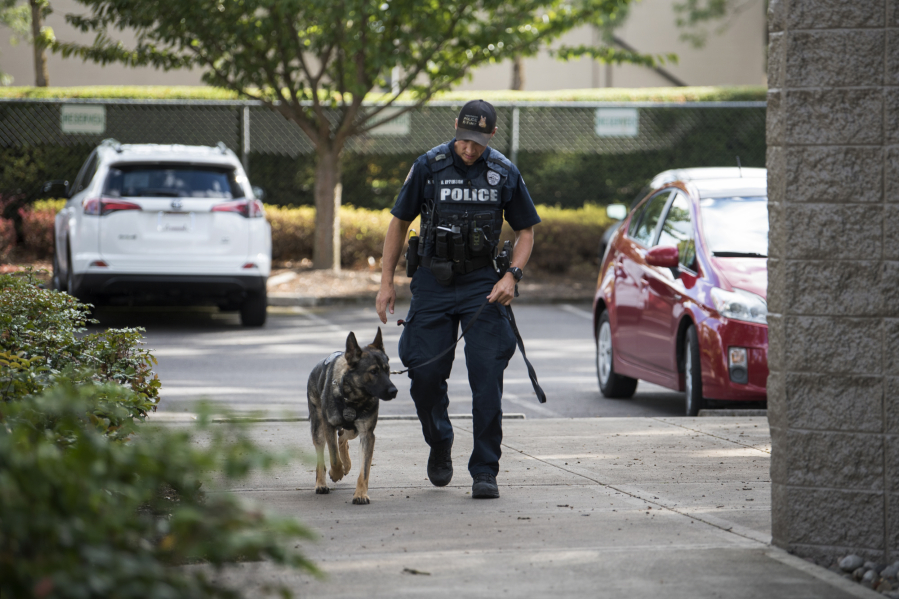Not all dogs can be police canines.
Those were the words of Vancouver Police Department Special Operations Sgt. Mark Blaisdell spoke to a group of kids at a local dog-oriented 4-H group. The group was donating money to the police department’s K-9 unit, and the children were expecting to see two new police dogs in action on the morning of Aug. 2.
Unfortunately, police and the K-9 unit were busy dealing with a standoff. The 4-Hers were instead given the opportunity to ask questions about the special officers and their four-legged partners. The major takeaway? The specialized unit undergoes rigorous and continuous training to build strong bonds between officer and animal.
Back in August, the unit was in the middle of training two officers and two new canines. The police department was reluctant to give access to that training; police dogs are popular with the public, but they don’t all make the cut.
With the training now finished, Officer Rocky Epperson and canine Koa have been patrolling together for about two weeks, although they’re still accompanied by a veteran officer in the unit and will be for some time.
Epperson and Koa responded to numerous calls in their first week on the job. Their partnership would have been impossible without a significant amount of time to build trust, Epperson said.
“I’ve had dogs, so the caring for (Koa) part wasn’t anything new. But, it is different than having a family pet. Our dogs are kenneled at our homes. They don’t come inside the house; they’re not socializing with the family. He’s a working dog and not a pet.”
It was late May when Epperson met Koa for the first time. He was working patrol at the time, which he’d done for about two years before switching units. He was at PeaceHealth Southwest Medical Center responding to a call.
Cpl. Ryan Starbuck and another unit officer who’d picked Koa for Epperson arrived at the hospital for an initial meet-and-greet.
“(Koa) was very inquisitive,” Epperson said. “He was running around and exploring. When I got closer to him, he seemed unsure of me, like he was wondering who I was and what I was doing.”
The encounter only lasted about five minutes. But moving forward, the duo started spending all their time with one another.
Over several months, the partners spent 400 hours learning canine patrol tactics and an additional 200 hours working on drug detection techniques.
Koa, and Epperson, were taught commands for things like suspect tracking, building and area searches and locating evidence. Making sure Koa obeyed all of those commands was imperative.
Epperson, and any other K-9 officer, has to ensure their dogs listen to them in any given situation. The officer said it’s the most difficult training he’s been through during his career in law enforcement. (Epperson served as an officer for eight years at the Longview Police Department before taking a job at VPD).
“There’s a lot going on. You have to think about what you’re doing, what your dog is doing, how your reactions and your mannerisms are having an effect on the dog,” Epperson said.
Starbuck described the partnership as two separate entities that need to act in unison, constantly adjusting from moment to moment.
Through repetitious training, Epperson said he thinks he and Koa have gotten on the same page. His commanding officer thinks so, too.
“Their relationship has changed over time,” Starbuck said. “I think they’ve become more comfortable with how they interact and play. Officer Epperson is definitely more comfortable around Koa, and the same can be said for Koa.”
According to a study published in Psychological Reports in 2000 titled “The Role of Police Dogs as Companions and Working Partners,” nearly all of the 255 officers who answered a questionnaire said they believed their relationship with their canine partner benefited their health and well-being.
“This study showed that both close companionship with the dog and involvement in selecting the dog were associated both with satisfaction with the dog and with working as a canine officer,” the study says.
Many of the officers involved in the study also said they believed their canine saved their lives while on the job at some point.
Starbuck said that before the dogs are chosen for placement among Vancouver’s police force, they jump around from place to place, to different organizations that aim to sell them to law enforcement agencies. It takes awhile for the dog to recognize there is now a sole person caring for it.
All but one of the dogs used by the Vancouver Police Department are German shepherds and male. The odd dog out is still a shepherd, just Dutch, according to Blaisdell.
Koa, and the second newly acquired dog, Oso, are from Hungary and the Czech Republic. Despite the rigorous selection process, the selected dogs don’t always make the cut. There was another dog picked by the K-9 unit, but it proved to be too headstrong.
That dog had the ability to do the work, Starbuck said, but it was less sociable. Police canines need to be obedient but also comfortable around officers, according to the corporal.
Koa appears to enjoy the company as well as the work, said Epperson.
“When I get him out of the kennel, he runs to the car, every single morning or afternoon. You can tell that he’s eager to go. He definitely knows it’s work, but he doesn’t look at it the same way I do.”
Handling police canines requires certification and regular recertification. Starbuck said the police department tries to do so annually, but it’s not required to do so.
Ultimately, the training never ends.
The job means hard work and added responsibilities. However, Epperson said he has no regrets with making the switch to the unit.
“I’m absolutely satisfied I made this decision. I have no regrets whatsoever,” he said. “As far as moving forward, I just want to keep working Koa, training him and enjoying it.”




